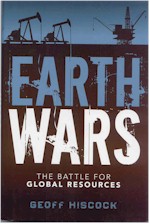 |
|
|
| ||||||
|
|
This page is the original source of this review, though you may also find it on Amazon or other sites. | ||
| Book Reviews Home | Free Audio Books | |
 |
Book Review of: Earth WarsThe Battle for Global Resources Price: $19.87 Availability: Usually ships within 24 hours |
| Review of
Earth Wars, by Geoff Hiscock (Hardcover, 2012) (You can print this review in landscape mode, if you want a hardcopy) Reviewer: Mark Lamendola, author of over 6,000 articles. I really like this book. It hits all of my "good" buttons and none of my "bad" ones. The author writes in a clear, consistent, very readable manner. No grammar gaffes, strangled syntax, misplaced modifiers, or spelling errors. So, both thumbs up on form. What about substance? He obviously did extensive research, as evidenced by his notes and the sheer number of facts presented. He avoided logical fallacies entirely, which is rare these days. This book contains many predictions, but Mr. Hiscock presented caveats and cautions rather than pretending he had an infallible crystal ball. By contrast, someone else's book I reviewed earlier this year made fairly wild predictions with a tone of certainty. Of course, one person's opinion isn't much information for a buyer to decide. What you really need to know is what's in this book and whether that information has value. It it worth your money to buy this book, and is it worth your time to read it? If you want to be an informed citizen, this book is a must read. No matter which country you are a citizen of. It addresses looming issues of existential importance. While generally, politicians are more concerned about plundering the populace on behalf of their corporate sponsors than doing anything to fulfill their lawful responsibilities, an informed citizenry may be able to force real change. And time for such change is running out. Even if you don't want to be part of a force for (long overdue) change, your understanding these issues will open the door for many interesting and substantive discussions. To me, these are powerful motivations for understanding what Mr. Hiscock wrote about.
And what, exactly did he write about? Chapter 1 lays out the theme. There are four essentials: food, water, energy, and metals. All of which are, according to the available data, not going to exist in sufficient quantity to meet demand. Soon. This means someone (many someones) will go without. Who will the haves and have nots be? And why? Will the list of predicted winners be very different from today's list of winners? What are the wild cards? In an expert way, Mr. Hiscock proceeds to answer these and related questions. Two looming figures in the next decades, when this will all unfold, are China and India. About a third of the entire human population lives in one of those two nations. Some interesting wrinkles in demographics, geography, and culture put China and India on different paths, but both will figure ever more hugely in humanity's consumption and production of resources. Yet, they are only part of a much more elaborate story. A story Mr. Hiscock tells with fact-based authority. Many books that address the future of our limited resources tend to be bleak. That's because they leave out some vital information. Perhaps it's because they want to write something dreadful because bad news sells. While there is bad news ahead, there are developments right now that provide some counterweight. Not only does Mr. Hiscock discuss those, but he also looks at coming developments that will help us cope with the coming constrictions on resources. So, rough times ahead but not a total disaster. For example, you may have read about China's projected energy needs and how that translates into X amount of oil and coal that we simply do not have. The real story on China is much different. Yes, China will use more oil and coal. But not nearly at the levels doomsayers predict. The Chinese are not stupid. They see what's ahead. And they are working on that even now. This book informs you as to what that work is, how it's panning out thus far, and what the projections are going forward. Mr. Hiscock provides a similar analysis for other major players, as well. Really great stuff. This book consists of 261 engrossing pages divided up into fifteen chapters and a conclusion. It has eight pages of maps, a four-page introduction, and an extensive index. Each chapter has endnotes, and there's also an impressive bibliography. It's worth noting that his sources are of excellent caliber. It really bothers me when I see a bibliography consisting mostly of dubious sources such as the New York Times or various Websites not exactly known for careful research. Mr. Hiscock made no such mistake. His is solid research. In addition to his written research, he also interviewed some impressive sources (see the Acknowledgements before you read the book). Here are a few chapter titles, just as a sample: Geographical Flashpoints, Finding Steel's Essential Ingredients, Japan After the Deluge, The Up and Comers. It's not often a book like this comes along. Don't pass up the opportunity to read it. | |
| |||||